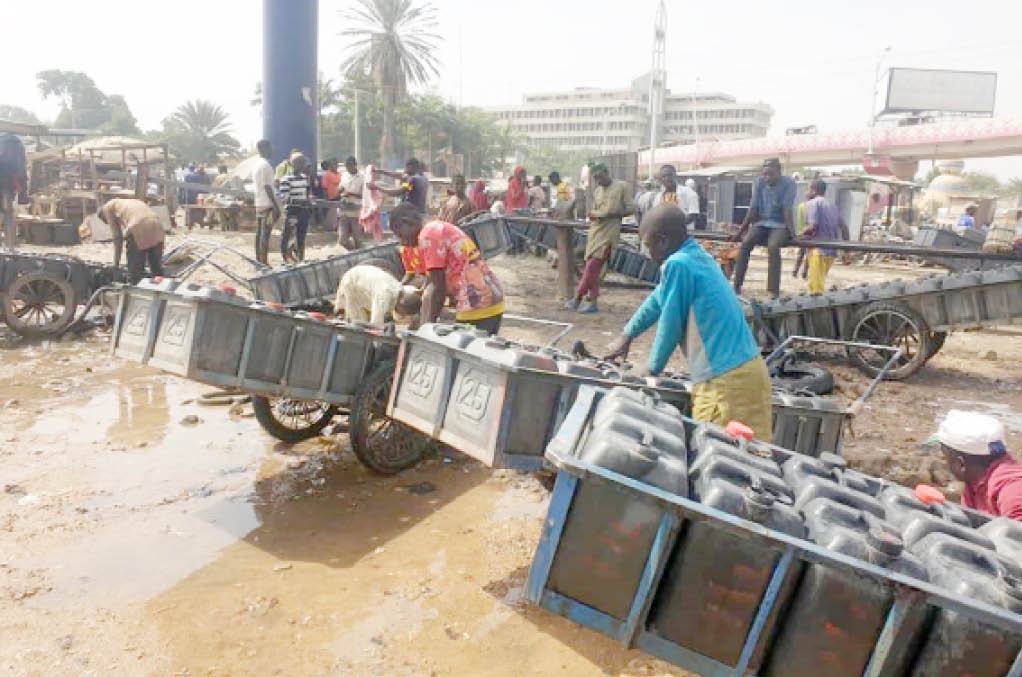In Kano, water vendors, locally called Yan Garuwa or Mai Ruwa, are among the top providers of essential services in the metropolis, especially because of the importance of water to everyone.
Their services became more vital because of the lack of (or insufficient) potable water in the city with many of its inhabitants saying they have gone several years without seeing water flow from the taps installed at some locations in the city.
- Senate gets ultimatum to probe ‘contract scam’ in NPC
- Obi of Onitsha: A phone call stopped me from boarding attacked Abuja-Kaduna train
Recent research conducted by a lecturer from the Bayero University Kano (BUK), Dr Aliyu Barau, stated that 97 per cent of households in Kano State drink contaminated water and that the state’s water board can only provide water to 3.2 per cent, while 70.1 per cent use water from wells and boreholes, and with the high poverty rate and economic hardship in the state and country at large, not all can afford to provide their own borehole to get water, hence the need for the water vendors in the state.
These vendors have become not only the suppliers of water for daily activities but also for the survival of many who depend on them for consumption.
But with this important place they hold in society, many of them believe the people they have been serving for years do not give them the regard they deserve.
Daily Trust on Sunday observed that almost all the metropolitan local government areas in Kano depend on water vendors for their water supply. Some of the notable areas, noticed to have large populations, include Kurna area which cuts across Dala, Ungogo and Fagge Local Government Areas, Fagge, Brigade, Yakasai, Kano Municipal among many others. The very few that get tap water live in the GRA, with some also depending on their own boreholes.

When Daily Trust visited the nerve centre of the water vendors in the heart of the city near the Kofar Nasarawa flyover, the place was a beehive of activities, with the vendors in their hundreds setting their trucks ready for water distribution in the city areas. Many of them, including those who run the place, narrated their ordeals and how they earn a living through the business.
The man in charge of selling to the vendors, Abubakar Ali, said they have over 30 taps in the place which feed over 200 trucks that purchase water on a daily basis.
“This place has been in existence for years and serving people with water. The vendors usually come here every morning to start their work and close in the evening. We serve at least 200 trucks every day and most of the trucks carry 20 Jerry cans; very few carry less than that. The business is really paying averagely but people don’t even know,” he said.
According to him, the wrong perception of the business by Kano people is part of the reason why it is dominated by people from neighbouring states like Katsina and Jigawa and even individuals from neighbouring countries like Niger Republic and Chad.
One of the vendors, Malam Jamilu Lawan, who has been in the business for over 20 years, said although his family lives in Katsina, he is feeding them and sponsoring his children’s education through the business.
“With this business, I cater for all my needs including that of my two wives and nine children. All my children are in school and doing well. Every day, I make between N1,500 and N2,500 and Alhamdulillah, I am contented.
“The only problem we have with this business is how a boy younger than your son will treat you. This has been my source of livelihood since the military regime in the country. I got my first truck weeks before the death of Abacha. In this business, despite the roles we play in providing drinking water for the residents, we are never accorded any respect by the customers and society. People see us as useless,” he lamented, while pushing his truck with 20 Jerry cans along the popular Kofar Nasarawa area.
Another water vendor, who sells water within Kurna area, Salihu Lawan, 26, said although he is making it through the business, he will not stay long in it before looking for a ‘more dignified’ job.
The Katsina-born Lawan said he came to Kano when he was around 17 years old for Qur’anic studies and later decided to venture into the business to avoid begging for food. He said they normally get the trucks from housewives and they remit money on a weekly basis.
“With this business, I can say my life is okay. But many people have said that the business poses a threat to our life. Also, people don’t value us although we are serving them with water for daily usage. Imagine life without us, where will people get water from?” He asked.
He added that with the increase in diesel price, they now pay N240 for 12 Jerry cans, against the previous price of N150.
“That is why we sell to our regular customers at N35 per Jerry can and N40 for others, unlike before when it was N20 or even N15. We have regular customers that have relied on us for many years; they will not buy from anyone else except us.
“Every day, I make seven to eight trips and from that I make around N3,000. In the morning, I make like five trips of 12 Jerry cans per truck while in the afternoon I do two or three depending on the weather and my strength,” he explained.
For Ibrahim Lawan, also from Katsina State, the five years he has spent in the business of selling water to Kano residents has been a rollercoaster. He said he makes six to seven trips every day during the hot weather and four to five during the cold season.
He said although he has been treated badly several times, he never considers it as bad because he is busy with his work and looking for a way to survive.
“I supply water to Yakasai, Durumin Iya, Kankarofi, Durmin Zungura and many other places in the city. I don’t care what people say, I am just busy with my business and always happy. I buy 20 Jerry cans of water for N100 from this place and sell each N50, which means for every trip I have N1,000. So, why should I worry myself when I earn almost N5,000 in a day,” he concluded.
However, many of the water vendors who spoke to Daily Trust noted that while they are making money in the business, they are also playing a great role in serving people with water, adding that without their services, many activities in the households and other places will experience failure.

 Join Daily Trust WhatsApp Community For Quick Access To News and Happenings Around You.
Join Daily Trust WhatsApp Community For Quick Access To News and Happenings Around You.


